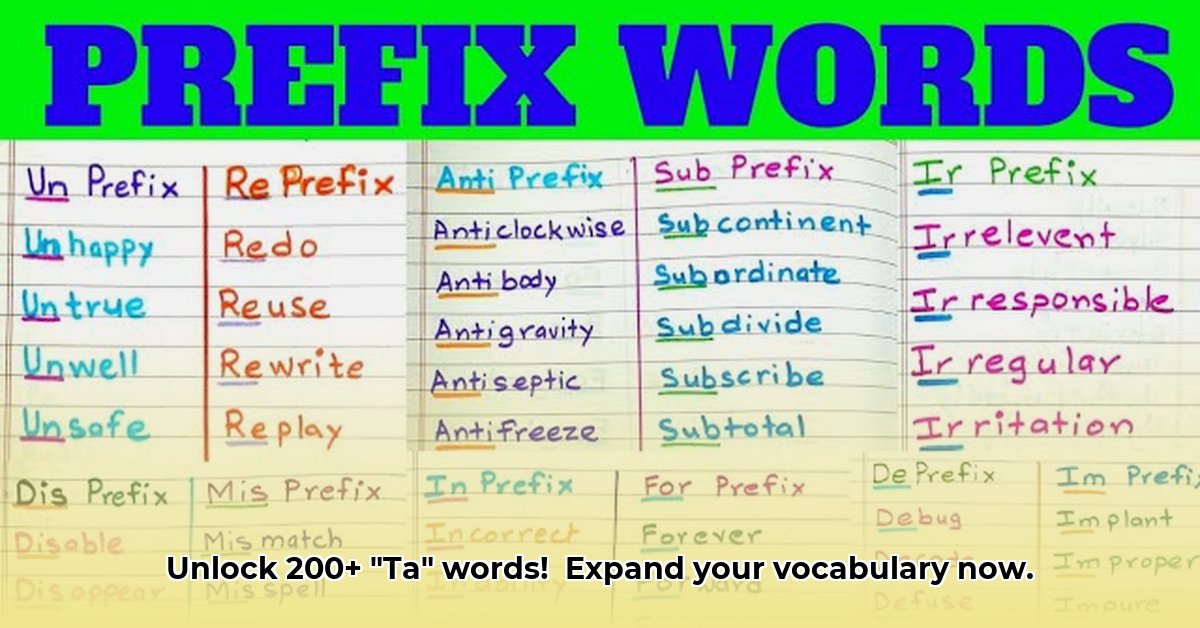
Words Beginning with the "Ta" Prefix: A Comprehensive Exploration
This article delves into the surprisingly extensive collection of English words beginning with "ta," categorizing them by part of speech and offering insights into their etymologies and usage. We'll explore both common and less frequent terms, illustrating the richness and diversity of the English lexicon. Understanding the nuances of these words enhances vocabulary and reveals fascinating aspects of linguistic history. For a more extensive list, check out this helpful resource: more "ta" words.
Everyday "Ta" Words: Frequent Flyers of the English Language
Many words starting with "ta" are so ingrained in everyday conversation that their origins often go unnoticed. Words like "table," "take," and "talk" are fundamental building blocks of English communication. Yet, their historical roots are rich and diverse.
"Table," for instance, traces back to Old French, ultimately deriving from the Latin word tabula, meaning "plank" or "flat surface." This highlights the historical connection between the physical object and the abstract concept. Similarly, "take" and "talk" boast older Germanic origins, showcasing the enduring influence of Proto-Germanic on modern English. These words, though commonplace, subtly reveal the layers of linguistic evolution that have shaped modern English.
Uncommon "Ta" Words: Unearthing Linguistic Gems
Beyond the everyday vocabulary, a wealth of less frequent words beginning with "ta" adds depth and precision to the English language. Terms like "tachometer," "tactile," and "taciturn" may not be daily conversation starters, but their inclusion expands our expressive capabilities.
Let's examine a few:
- Tachometer: (an instrument measuring rotational speed) Derived from Greek roots, tachos (speed) and metron (measure).
- Tactile: (relating to the sense of touch) From the Latin tactilis, highlighting its focus on physical sensation.
- Taciturn: (reserved or untalkative) Tracing its origins to Latin, it reflects a personality trait.
These less-common words, though less frequently used, demonstrate the breadth and sophistication of the English language. Their incorporation into one's vocabulary enriches communication and demonstrates a refined understanding of linguistic nuances.
Categorizing "Ta" Words by Grammatical Function
Analyzing words beginning with "ta" by their grammatical roles reveals fascinating patterns and demonstrates the diverse functions these words serve within sentences.
| Part of Speech | Examples | Etymological Notes |
|---|---|---|
| Noun | Table, talent, task, taxi, tact, tapestry | Diverse origins, reflecting various influences |
| Verb | Take, teach, tame, tap, tantalize, tackle | Predominantly Germanic and Latin roots |
| Adjective | Tall, tame, tasty, taciturn, tactile, tangled | A mixture of Germanic and Latin origins |
| Adverb | Tactfully, tamely, tightly | Often derived from corresponding adjectives |
This table offers a glimpse into the variety of "ta" words. Further exploration will undoubtedly uncover many more.
The Enigmatic "Ta-" Prefix: A Linguistic Puzzle
The prefix "ta-" itself presents a linguistic puzzle. It lacks a single, consistent meaning, with its interpretation depending heavily on the word it modifies. This ambiguity suggests a possible origin in older language structures or perhaps a combination of smaller prefixes. Its elusive nature highlights the complexities of etymological investigation. The prefix remains an intriguing area of linguistic study.
Expanding Your Vocabulary: A Continuous Journey
This exploration into the world of words beginning with "ta" aims to stimulate interest in the often-overlooked aspects of language. The study of etymology reveals the historical layers that have shaped modern English, and the exploration of less frequent words expands our vocabulary and communication skills. Further research using online dictionaries and etymological resources will undoubtedly lead to the discovery of even more linguistic gems. The best way to master these words is through active use. Begin incorporating some of these new words into your writing and daily speech.
How to Enhance NLP Models for Low-Frequency Words (A Critical Aspect)
How can we improve natural language processing (NLP) models to better handle low-frequency words? This is a crucial consideration, particularly in specialized fields where rare terminology abounds. Successfully addressing this challenge requires a multifaceted approach.
Strategies for Improving NLP Performance with Low-Frequency Words
- Data Augmentation: Enhancing the training dataset with synthetic examples generated through back-translation or synonym replacement.
- Word Embeddings: Using contextualized embeddings, like those generated by BERT or RoBERTa, to capture semantic relationships, even for rare words.
- Subword Tokenization: Dividing words into smaller units (morphemes) to handle out-of-vocabulary terms.
- Transfer Learning: Leveraging pre-trained language models (PLMs) which offer a broad vocabulary base from which to learn.
A Practical Example: NLP in Medical Diagnostics
Consider building an NLP model for analyzing medical reports. Rare medical terms pose a significant challenge. Here's a practical approach:
- Gather a comprehensive corpus of medical reports.
- Utilize subword tokenization to manage abbreviations and neologisms.
- Employ a contextualized embedding model like BERT for superior understanding of context.
- Thoroughly evaluate and refine your model based on performance metrics.
Key Takeaways:
- Contextual information is crucial for accurate NLP; simple Bag-of-Words models fall short.
- Addressing low-frequency words is critical for effective NLP in specialized fields.
- Word embeddings and contextualized embeddings significantly improve the handling of rare terms.
- Data augmentation and subword tokenization are valuable supplementary strategies.
- Constant evaluation and iterative refinement are paramount for model success.